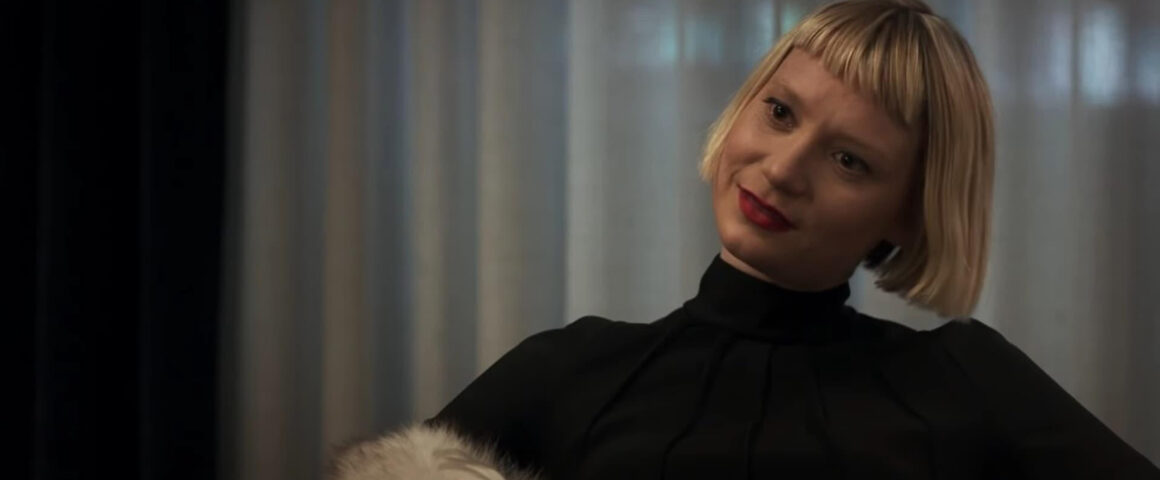Piercing has the singular, most chilling opening sequence I have ever seen in a movie. I don’t think it can get any more horrifying than an ice pick brandished in a newborn baby’s face. This immediately set me on edge, and this tension continued all through the exposition. It seems that Reed (an eerily unsettling Christopher Abbott, “It Comes at Night”) has some kind of sadistic impulse he wants to enact on his infant. In order to deal with this urge, he travels somewhere else, checks into a hotel room, and goes about rehearsing the perfect murder in preparation for an actual murder.
It gets darker and more gag-inducing as we witness Reed plan the murder down to the tiniest detail, recording everything in his red notebook (how symbolic). Abbot produces some quality acting here as he mimes stabbing the potential victim, his face filled with the utmost focus, his muscles straining as if this is more than a mere rehearsal. The sound effects here, where we are privy to the loud slashes of the knife and the dripping of blood, may actually be more disconcerting than director Nicolas Pesce (“The Eyes of My Mother”) giving us a visual. The mind conjures up far worse things when left to its own devices.
Reed may have planned everything, but he didn’t account for Jackie (Mia Wasikowska, “Crimson Peak”), the neurotic call girl who doesn’t allow things to unfold the way Reed wants. Wasikowska, who has played her fair share of eccentric roles, seems to relish the fiendish acting challenge that has been thrust upon her. Her character moves from manic to gleeful so quickly that it’s hard to tell what is calculated and what is genuine. As the plot unravels, we are unsure if her actions are prompted by her own inner demons or a reaction to Reed’s homicidal attempts. It is ironic that at one point she says, “I want you to wear my skin” when in truth, her skin is so tightly wrapped around her, dripping in ambiguity. She is unreadable. Just as Reed thinks she wants what he desires to do to her, she changes her course again. While Reed’s demons are revealed to us during a drug-induced episode, we never get any insight into Jackie’s, besides her proclivity towards self-harm or letting others harm her. They are obvious foils for each other, a kind of yin and yang — opposite yet complementary. Reed represents order while Jackie is chaos.
Pesce uses some nice stylistic touches in the film, like the use of split screens to show different points of view, the sometimes spine-tingling soundscape and the moderate, but effective, use of CGI. Cinematographer Zack Galler (“The Ticket”) makes good use of colors in the interiors to help establish the symbolic references Pesce wishes to set. Jackie’s apartment has a darker motif, with the black walls and crimson carpet. Even the underwear and clothing she wears when she first encounters Reed are black. This is in contrast to the costuming of his wife Mona (Laia Costa, “Maine”), who wears a white turtleneck throughout the movie. While Jackie bares herself, Mona remains conservatively preserved in her white, innocent turtleneck. But Reed can’t relax in his wife’s arms, it is only with Jackie that he can seem to relax into himself, the pain and bound nature of the S&M world ironically allowing him to be free.
At times the movie does come across as torture porn, with the two main characters clamoring to see who can do the most damage. Both are involved in a struggle to gain the upper hand, though by the end of the movie, the tension is all but gone as we start to feel it is all a game rather than life and death. Hence, the movie doesn’t seem like it has a point to make, which makes all its attempts to stun the viewer rather shallow. We might have been horrified in the moment, but all is forgotten once the movie ends. Piercing is all flash and no substance — the end result never taking on any kind of permanence. Rather like it’s title, it is brief hint of pain, before the sweet feeling of relief when it’s over.



